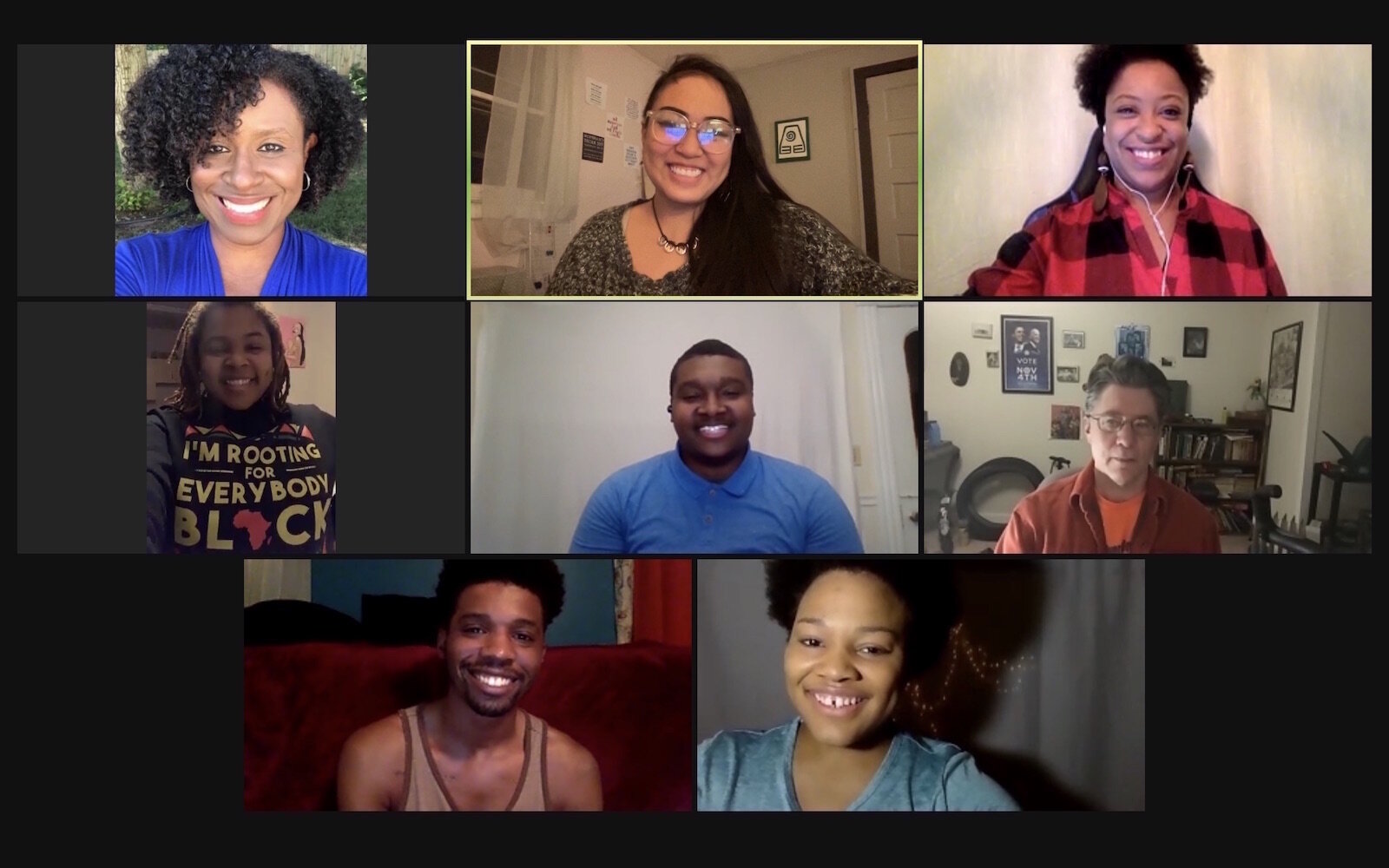Face Off Theatre’s new season casts rebirth as work to make society more just, equitable, inclusive
Face Off Theatre is "coming out of our beginnings into a new era," artistic director Marissa Harrington says. So they are calling the 2021 season Rebirth.
Editor’s note: This story is part of Southwest Michigan Second Wave’s On the Ground Kalamazoo series.
Face Off Theatre Company’s new season is titled “Rebirth.”
“We visualized a phoenix rising from the decimated earth of 2020!” artistic director Marissa Harrington says, laughing.
This season is a rebirth for a theater hoping to soon play to a live audience again, as well as their coming rebirth as an independent company. Face Off is amicably moving from the Black Arts and Cultural Center to a new home in the Dormouse Theatre, and is filing for its own nonprofit status.
“We’re coming out of our beginnings into a new era,” she says.
But also it’s a hope for the country’s rebirth out of 2020. “As a society, a lot of us are feeling like 2021, with some of the changes in government, we’re feeling like, ‘Okay, now let’s progress. Let’s continue this work,” Harrington says.
When she’s thinking of rebirth, she’s also thinking of continued work “to make us a better society, more-inclusive, more-equitable, with justice,” she says. “It’s just not out of 2020, I think it’s out of 2020 and before.”
Shunning roots, regaining roots
To kick off the season, Face Off is telling the story of a woman who goes through a couple of rebirths.
“Fabulation or, The Re-Education of Undine” is a social satire by double Pulitzer Prizewinning playwright Lynn Nottage.
Undine (Khadijah Brown) became a success building up her own PR firm. She put her past life in the projects behind her, going so far as to claim a fire took her family. When her husband (James Jenuwine) divorces her, cleans out her bank account, and leaves her pregnant and broke, things are pretty awkward when she has to return to her un-burnt and living family in Brooklyn.
Coming out of a rough year for everyone, Harrington says, the theater wanted to open “with a story that still has some grit, but is under the guise of a comedy.”
“Let’s showcase a story that still talks about real issues and things that people can relate to, that most people can relate to, and talk about it in a way that can make you laugh, possibly make you cry, but mostly create conversation,” Harrington says.
In a Zoom discussion with the cast, Charles-Curtis, who plays the poet/veteran FLOW (and other characters — the script calls for a small cast to play multiple parts), confesses he didn’t like the script when he first read it.
“I don’t like satires,” he says. “This ain’t real to me.” But then he realized that “all of these characters are putting on a facade or trying to promote themselves, to be something that they’re not. They’re all fakin’ it until they’re makin’ it.”
Director Ynika Yuag says “Fabulation” is usually described as “‘a climb down the social ladder,’ and I think that’s an incredible way of framing the story.”
It is about rebirth, she says. “Clearly she’s lost all of her capital, all of what we would consider normal success in American capitalist society, but she’s reborn…. (She sees that) my roots are the people who raised me and supported me throughout my life.”
Though it’s about a fall from status, “Fabulation” shows that “in climbing down the social ladder, I think it’s a wonderful irony that even though you lose so much, you gain so much more in that process.”
Does the play run on the theme of African-Americans feeling the need to, in order to achieve perceived success, erase where they’ve come from? To present a facade?
“It definitely does,” Elizabeth Taylor (Stephie and multiple characters), says. “And especially being a Black woman, it’s so hard to remain a top dog in a male-dominated society. Not only to be Black, but also to be a Black woman. It’s like there’s so much energy, so much sweat, so many tears go into your success, and then you have to play this hard persona so people just won’t walk all over you.”
“I know there can be a balance, especially when you’re sure who you are and what you want to do in life,” Taylor continues. “She wasn’t sure of herself. She was sure of her goals, but she wasn’t sure of herself, because she let go of the very thing” — her family — “that rooted her, that grounded her.”
It’s all in the pressure to assimilate, Harrington adds. “In this society, if you are anything other than white/European and male, there are a lot of things you have to do to get to the top or to achieve perceived success, and I think for many years we have aligned that to whatever is closest to whiteness, that’s what success is.”
She hopes “Fabulation” will make people go “Hmmm. Is there balance? I’m pretty sure there can be balance. I’m pretty sure you can stay true to who you are, where you came from, and still achieve success, and not feel like you have to sacrifice who you are. It’s a yes/and thing. It’s both.”
Charles-Curtis says, “I grew up on both sides of the track. My dad was one of the bosses at Pfizer, he worked in manufacturing. And my mom was on food stamps and Section 8.” His mother worked her way through school to become a home-aid nurse.
He heard how both spoke on the phone to clients, coworkers, and subordinates, how “both had to change their personalities to fit into these cultures.” But, he feels, “the power of assimilation back in the day when I was growing up was different than how it is today.”
Brown can relate, somewhat, to her character Undine. “I was raised in family, however, it wasn’t always sweet, it wasn’t always good, and I can remember a lot of times I wanted a new family — but I didn’t do what Undine did,” she says.
“Her family was there pretty much for every highlight of her life before she abandoned them,” Brown says.
“At the end of the day the only people that got your back are the people that raised you up,” Charles-Curtis says.
Social satire, socially distanced
Face Off hopes that later stagings will be in front of a live audience, but “Fabulation” is undergoing a strict COVID-era production.
The cast is rehearsing via Zoom. After COVID tests and health screenings, they’ll have a week to rehearse in person. Then “Fabulation” will be staged, shot on video, and streamed Feb. 26-28.
They want potential audiences to know, as Charles-Curtis says, “This ain’t just a Black show. I think a lot of people could relate to this show.” “Fabulation” shows that no matter one’s culture or where they come from, “they can always be humbled, so love and appreciate the people they’re around.”
Taylor adds, laughing, “A lot of Black plays are meant for white people to watch! Especially with satirical stuff, a lot of them are not supposed to be just for a ‘melanated’ audience, I’ll call it.”
Herrington says, “‘Preach to the choir,’ I think that’s the phrase you’re talking about. ‘Preaching to the choir’ — if it’s only for us, but we know what’s going on.”
“We know what’s going on,” Taylor says. “This play, in particular, it’s like, we just happen to be Black, at this moment? It’s really just about the experience — this person came from this family tries to sever their ties with this family, to get up on the world. And the world decided to be like, ‘Ehh, I’m gonna toss you back from whence you came.'”
Face Off Theatre Company’s season of “Rebirth”:
“Fabulation, or The Re-Education of Undine,” Feb. 26-28, online only. Free or pay-what-you-can. Register to view here.
“I Am Grace,” New Play Series, May 21-23. Local playwright Vickie G. Hampton’s story of forgiveness following an unspeakable violent event.
“Pipeline,” July 16-18. By nationally known playwright Dominique Morisseau, on a mother’s effort to keep her son out of the school-to-prison pipeline.
“Smoldering Fires,” Youth Series, Aug. 20-21. Kermit Frazier’s story about two boys who learn about the Civil Rights movement while trying to clean up their neighborhood.
“Hurt Village,” Nov. 12-14. Scenes from the last days of a Memphis housing project, by Katori Hall (“The Mountaintop”). “So excited!” Harrington says. “I love that we’re bookending the season with two very strong Black female playwrights.”
All but “Fabulation” and “Hurt Village” are rescheduled from last year’s cancellations.
Face Off was able to stage “Crowns” last year, before they had to shut down.
But they weren’t inactive in 2020, Harrington says. The theatre collaborated with Farmers Alley Theatre on an outdoor production of the musical “Three Little Birds” in the summer, plus held online events.
“I can’t wait for us to be in-person full time with audiences,” Harrington says. Don’t know when that’s going to happen yet!”




















